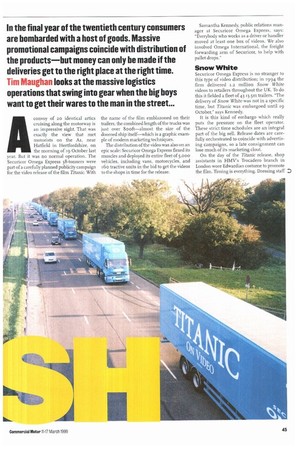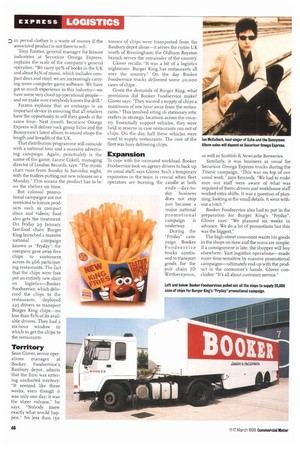In the final year of the twentieth century consumers are
Page 47

Page 48

If you've noticed an error in this article please click here to report it so we can fix it.
bombarded with a host of goods. Massive promotional campaigns coincide with distribution of the products—but money can only be made if the deliveries get to the right place at the right time. Tim Maughan looks at the massive logistics operations that swing into gear when the big boys want to get their wares to the man in the street...
A convoy of 20 identical artics cruising along the motorway is
an impressive sight. That was exactly the view that met motorists on the Ai, near Hatfield in Hertfordshire, on the morning of r9 October last
year. But it was no normal operation. The Securicor Omega Express 38-tonners were part of a carefully planned publicity campaign for the video release of the film Titanic. With
the name of the film emblazoned on their trailers, the combined length of the trucks was just over 800ft—almost the size of the doomed ship itself—which is a graphic example of modem marketing techniques.
The distribution of the video was also on an epic scale: Securicor Omega Express flexed its muscles and deployed its entire fleet of 5,0= vehicles, including vans, motorcycles, and 16o tractive units in the bid to get the videos to the shops in time for the release.
Samantha Kennedy, public relations manager at Securicor Omega Express, says: -Everybody who works as a driver or handler moved at least one box of videos. We also involved Omega International, the freight forwarding arm of Securicor, to help with pallet drops."
Snow White
Securicor Omega Express is no stranger to this type of video distribution; in 1994 the firm delivered 1.2 million Snow White videos to retailers throughout the UK. To do this it fielded a fleet of 43 I3.5m trailers. "The delivery of Snow White was not in a specific time, but Titanic was embargoed until 19 October," says Kennedy.
It is this kind of embargo which really puts the pressure on the fleet operator. These strict time schedules are an integral part of the big sell. Release dates are carefully orchestrated to coincide with advertising campaigns, so a late consignment can lose much of its marketing clout.
On the day of the Titanic release, shop assistants in HMV's Trocadero branch in London wore Edwardian costume to promote the film. Timing is everything. Dressing staff
in period clothes is a waste of money if the associated product is not there to sell.
Tony Faratro, general manager for leisure industries at Securicor Omega Express, explains the scale of the company's general operation. "We carry 90% of books in the UK and about 85% of music, which includes compact discs and vinyl; we are increasingly carrying more computer game software. We have got so much experience in this industry—we have some very clued up operational people— and we make sure everybody knows the drill."
Faratro explains that an embargo is an important device in ensuring that all retailers have the opportunity to sell their goods at the same time. Next month Securicor Omega Express will deliver rock group Echo and the Bunnymen's latest album to record shops the length and breadth of the UK.
That distribution programme will coincide with a national tour and a massive advertising campaign. Again, punctuality is the name of the game. Laurie Cokell, managing director of London Records, says: "The music chart runs from Sunday to Saturday night, with the traders putting out new releases on a Monday." This means the product has to be on the shelves on time.
But colossal promotional campaigns are not restricted to leisure products such as compact discs and videos; food also gets the treatment. On Friday 29 January. fast-food chain Burger King launched a massive national campaign known as "Fryday": the company gave away free chips to customers across its 466 participating restaurants. The fact that the chips were free put an entirely new slant on logistics—Booker Foodservice, which delivered the chips to the restaurants, deployed 225 drivers to transport Burger King chips—no less than 81% of its available drivers. They had a six-hour window in which to get the chips to the restaurants.
Territory
Sean Glover, senior operations manager at Booker Foodservice's Banbury depot, admits that the firm was entering uncharted territory: "It seemed like three weeks, even though it was only one day; it was the sheer volume," he says. "Nobody knew exactly what would happen." No less than 150 tonnes of chips were transported from the Banbury depot alone—it serves the entire UK south of Birmingham; the Oldham Royston branch serves the remainder of the country.
Glover recalls; "It was a bit of a logistics nightmare. Burger King has restaurants all over the country." On the day Booker Foodservice trucks delivered some 20,000 cases of chips.
Given the demands of Burger King, what provisions did Booker Foodservice make? Glover says: "They wanted a supply of chips a maximum of one hour away from the restaurants." This involved siting 16 stationary artic reefers in strategic locations across the country. Essentially support vehicles, they were held in reserve in case restaurants ran out of chips. On the day, half these vehicles were used to supply restaurants. The core of the fleet was busy delivering chips.
Expansion
To cope with the increased workload, Booker Foodservice took on agency drivers to back up its usual staff, says Glover. Such a temporary expansion in the team is crucial when fleet operators are burning the candle at both ends—day-today business does not stop just because a major national promotional campaign is underway.
During the "Fryday" campaign Booker Foodservice trucks continued to transport goods for the pub chain JD Wetherspoon,
as well as Scottish 8r. Newcastle Breweries.
Similarly, it was business as usual for Securicor Omega Express trucks during the Titanic campaign. "This was on top of our usual work," says Kennedy. "We had to make sure our staff were aware of what was required of them; drivers and workhouse staff worked extra shifts. It was a question of planning, looking at the small details. It went without a hitch."
Booker Foodservice also had to put in the preparation for Burger King's "Fryday". Glover says: We planned six weeks in advance. We do a lot of promotions but this was the biggest."
The high-street consumer wants his goods in the shops on time and the sums are simple: if a consignment is late, the shopper will buy elsewhere. Vast logistics operations—made more time-sensitive by massive promotional campaigns—ultimately end up with the product in the consumer's hands. Glover concludes: "It's all about customer service."












































































































